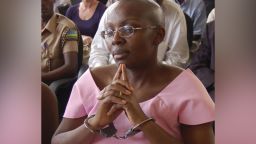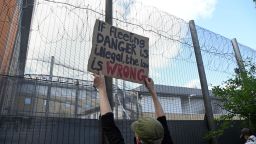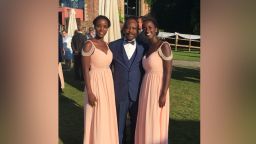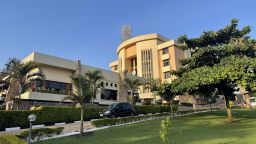For decades, Paul Kagame has ruled Rwanda with an iron fist in the mold of the archetypal strongman African leader.
Under his rule, the East African country has emerged from the ruins of a devastating 1994 genocide that left nearly one million people dead to be hailed by Western allies as the model for growth in Africa.
In recent years, the country has forged a strong and financially rewarding alliance with Asian powerhouse China, which is also known for its authoritarian rule.
The US and the UK have also supported Rwanda with aid donations for many years, and US diplomat Tibor Nagy once described the country as “demonstrating the true potential of Africa.”
“In the past 25 years, Rwanda has reimagined itself as a strong state that invests in good governance and the success of its people,” the US Assistant Secretary of State for African Affairs said on his first visit to Rwanda in 2019. “In many ways, Rwanda is demonstrating the true potential of Africa.”
In a recent meeting between US Deputy Secretary of State Wendy Sherman and Rwandan Minister of Foreign Affairs Vincent Biruta, the US acknowledged it still had a strong bilateral partnership with Rwanda but also raised concerns about human rights in the country.
In a report last year detailing human rights practices in Rwanda, the US State Department identified “significant human rights issues” that range from “unlawful or arbitrary killings by the government” to “forced disappearance by the government,” among others.
Critics say the successes of Kagame’s authoritarian rule have come at the expense of human rights in the country.
Rwanda is this week hosting the Commonwealth Heads of Government Meeting (CHOGM) in the capital Kigali, the first gathering of Commonwealth leaders in four years. Prince Charles, British Prime Minister Boris Johnson, and Canadian Prime Minister Justin Trudeau are among world leaders attending.
The UK is ermerging as one of Rwanda’s strongest allies and PM Johnson said in interviews from CHOGM that criticism of Rwanda is based on “stereotypes of Rwanda that is now outdated.” UK Home Secretary Priti Patel recently brokered a £120 million ($147m) deal with Rwanda to send asylum seekers to the East African country, an accord that hangs in the balance after a last-minute intervention by the European Court of Human Rights (ECHR).
Patel described Rwanda as “a safe haven for refugees” as the UK vowed to push ahead with the controversial scheme.
‘No safe haven’
Far from being a “safe haven” for refugees as claimed by Patel and others in the UK government, Rwanda has been accused by human rights groups of treating refugees badly.
In 2018, at least 11 Congolese refugees were killed when Rwandan police opened fire at the Kiziba refugee camp and Karongi town as refugees protested cuts to their food rations, Amnesty International reported at the time. Rwandan authorities told CNN the country’s police resorted to shooting to control a group of violent protesters and said it was an isolated incident.
Rwanda had previously received refugees from Israel.
According to Israeli media, some of the refugees deported to Rwanda between 2014 and 2017 were struggling to survive, with some destitute. Many of the refugees have fled Rwanda while some others who chose to remain in the country have been denied official documents by Rwandan authorities, leading to the arrest and imprisonment of some, Israeli media Haaretz reported.
The UK/Rwanda asylum deal comes less than a year after the UK’s International Ambassador for Human Rights, Rita French, said she was displeased with Rwanda’s refusal to probe human rights abuses as recommended by the British government.
Lewis Mudge, the Central Africa Director at Human Rights Watch, told CNN recently that “the UK has cynically decided to change its position on Rwanda… it’s going to ignore the human rights abuses in Rwanda and claim that it is a safe and acceptable country to send refugees to, to justify this cruel and immoral program.”
He added that Rwanda is a safe country only for those who toe the line.
“Just because Rwanda is clean and is safe for the Westerners doesn’t necessarily translate to safety for all Rwandans. Rwanda is a safe country for Rwandans if you keep your head down and don’t ask any questions or challenge anything. The moment you step up and start to question something or have an independent opinion and express it, Rwanda becomes a very difficult country to live in. These Western countries need to recognize that,” Mudge added.
A spokesperson for the Rwandan government declined to comment on HRW’s allegations, dismissing the agency as “a discredited source.”
Mudge described the UK-Rwanda asylum deal as an affront to the Commonwealth’s values.
“The UK is ostensibly the leader of the Commonwealth and this is an abdication of one of the pillars of the Commonwealth, which is the fundamental respect for human rights,” he said.
Refugees sent from the UK would comprise various nationalities, but Rwandan Foreign Minister Biruta said the asylum program will only be for people seeking asylum in the UK who are already in the UK and would exclude refugees from Rwanda’s neighbors such as the DRC, Burundi, Uganda, and Tanzania.
The UK government had said the program was targeted at curbing people-smuggling networks and discouraging migrants from making dangerous sea journeys to the UK.
From genocide to growth
To his supporters and Western and Asian allies, President Kagame is a liberator who has modernized and transformed Rwanda, a former Belgian colony.
His party, the Rwandan Patriotic Front (RPF), has been in power since the end of the civil war in 1994, with Kagame serving as vice-president and defense minister until 2000 and then president for the last 22 years.
Kagame unified the country after the genocide, working to abolish the divisive terms “Hutu” and “Tutsi” and to integrate the two cultures.
The gains made in Rwanda under his rule are undeniable.
Rwandan government spokesperson Yolande Makolo told CNN the country has made remarkable progress in the last 28 years, citing increased life expectancy, near-universal healthcare, and low corruption levels in the country.
According to the World Bank, Rwanda has witnessed “strong economic growth … accompanied by substantial improvements in living standards.” A report by the World Bank in 2020 stated that the country also has been successful in “reducing administrative corruption … from an accepted practice to one that is regarded as illegitimate and, once identified, one that is punished.”
Rwanda also ranks 1st among 13 low-income economies and 7th among the 27 economies of Sub-Saharan Africa for its innovation capabilities on the 2021 Global Innovation Index.
The country has further endeared itself to the West by advancing gender equality and creating a female-dominated cabinet. Around 61% of its parliamentary seats are held by women.
Kagame has been aggressive in attracting foreign direct investment into the country. In 2018, the Rwandan government signed a three-year promotional deal with English Premier League side Arsenal “as part of the country’s drive to become a leading global tourist destination, using ‘Visit Rwanda’ messaging,” the English football club said in a statement.
Arsenal’s male and female team jerseys have featured the ‘Visit Rwanda’ logo on their left sleeve ever since.
Crackdown on opposition
However, such gains notwithstanding, Kagame’s rule has been characterized by widely reported human rights abuses.
The Freedom in the World 2022 Report by Freedom House found that “while the regime has maintained stability and economic growth, it has also suppressed political dissent through pervasive surveillance, intimidation, torture, and renditions or suspected assassinations of exiled dissidents.”
Rwandan opposition politician Victoire Ingabire was the presidential candidate of the Unified Democratic Forces (UDF) party in the 2010 Rwanda presidential elections and says she is a victim of Kagame’s crackdown on dissent.
She told CNN she had left the Netherlands, where she lived with her family, to play an active role in Rwandan politics but ended up being jailed on what she says were trumped-up charges of terrorism and threatening national security by the Kagame regime.
“I was arrested in 2010 and spent eight years in prison. In 2018, I was released by a presidential pardon which came with the condition that I couldn’t leave Rwanda freely without government permission. Three times I have asked for permission to visit my family in the Netherlands but the government did not respond to my request,” Ingabire said.

Rwandan government spokesperson Makolo told CNN Ingabire “was tried and convicted of serious crimes including complicity in acts of terrorism and promoting genocide ideology.”
Makolo added that: “Ingabire had her conviction commuted after she appealed for clemency, however her criminal record remains because her crimes were proven beyond doubt.
“As part of this deal, she has to request to leave the country, as does anyone else in the same situation.” Makolo did not comment further on the status of Ingabire’s requests to leave the country.
Ingabire said she challenged her imprisonment at the African Court on Human and Peoples’ Rights – established by the African Union – in 2014 and was acquitted three years later after the court found that the Rwandan government had violated her rights.
Ingabire says she now lives in fear.
“I am afraid for my life … because you don’t know what can happen to you if you’re a member of the opposition,” she told CNN via a phone call.
“If you criticize the government, you are labeled as an enemy of the state, and then you’re arrested and put in prison … President Kagame does not tolerate criticism against his regime.”
Makolo did not respond to the specific incidents Ingabire spoke about. She, however, accused Ingabire of making “baseless claims” against Rwandan authorities.
“Despite being labeled as an opposition politician, she (Ingabire) has no discernible policy platform, she doesn’t offer solutions that would help improve our country. She only uses her platform to make baseless claims about the government. This doesn’t help advance our nation’s progress,” Makolo said.
Responding to the widespread reports of abuse, Makolo said Rwanda could not be characterized as a country with no respect for human rights.
“This characterization bears no relation to the country I know … A central principle of Rwanda’s reconstruction has been ensuring that every single person is treated … as a human being – that means that we do not tolerate discrimination of any form. This is enshrined in our constitution and upheld by our commitment to the rule of law,” Makolo told CNN.
Another outspoken critic of Kagame is Paul Rusesabagina, who was last year convicted of terrorism-related charges and sentenced to 25 years in prison by a court in Kigali. Rusesabagina, who inspired the film “Hotel Rwanda,” was renowned for saving more than a thousand Rwandans during the country’s genocide by sheltering them in the hotel he managed.
He was accused by Rwandan prosecutors of being involved with the National Liberation Front (FLN), an armed wing of the Rwanda Movement for Democratic Change (MRCD). Rusesabagina admitted to having a leadership role in the MRCD but denied responsibility for attacks carried out by the FLN.
His family says he was not given a fair trial and was kidnapped while overseas and returned to Rwanda in August 2020. Rusesabagina told the New York Times in a video interview he was en route to Burundi on a private plane to speak to churches on August 28 but found himself surrounded by soldiers in Rwanda when he woke up.
Speaking to CNN at the time, Kagame denied claims that Rusesabagina was kidnapped and renditioned to Rwanda.
“It was very proper and legal,” Kagame said of Rusesabagina’s arrest.
“If he was working with somebody in Burundi in the same plot of destabilizing our country, and the same person, for example, decided to drive him to Kigali – the person he was working with, and he had trusted – and the government was working with that person he trusted, how does the government become culpable for that operation?” he added.
‘Rwanda is a poor country’
In addition to raising human rights concerns around the asylum deal, opposition politician Ingabire says that high unemployment rates in Rwanda will prevent the refugees deported by the UK from building lives there.
“There is a high rate of unemployment in Rwanda, especially among the youth. … What will happen to the refugees when the British government stops funding their accommodation? They don’t have a future in Rwanda,” Ingabire said.
She also considers Rwanda’s economic growth a myth, as poverty remains prevalent in the country’s rural areas. According to the UN’s Multidimensional Poverty Index, poverty rates in rural parts of the country stand at 42%, far higher than in cities at 15%.
“Outside Kigali, there are no infrastructures as what you see in Kigali. The Rwandan government has not increased employment across the country, that is why we have the majority of poverty in the rural areas,” Ingabire told CNN.
The government declined to comment on Ingabire’s claims.





